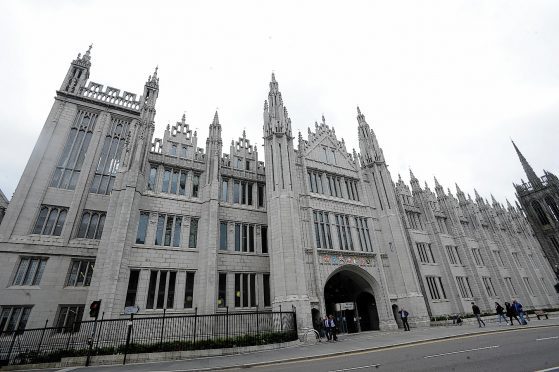It’s often said that a week is a long time in politics – and by that logic 2012 was a lifetime ago.
Since voters went to the polls in the Granite City five years ago to elect their local councillors, the landscape has been transformed by votes against Scottish independence and in favour of Brexit.
In Aberdeen many of the councillors elected at the last elections have also moved on with the times.
The 2015 SNP landslide at Westminster resulted in former SNP group leader Callum McCaig being elected as the MP for Aberdeen South, while his councillor colleague Kirsty Blackman was elected for Aberdeen North.
Former Conservative group leader Ross Thomson is now a north-east MSP following his party’s rise to prominence in the Scottish elections the following year.
In 2012, Labour won a surprise victory and enlisted the support of the Conservatives and independents to form a ruling coalition.
It had campaigned hard on opposing controversial plans to raise Union Terrace Gardens to street level.
During the five-year town house term the leadership has changed – Barney Crockett being ousted and replaced by Jenny Laing.
The Liberal Democrats meanwhile, who lost a massive 10 seats, were reduced from an administration party to a small opposition group.
This time, the SNP are hopeful they will become the biggest party in the town house, and hope to win over floating voters with pledges for a new multi-million bridge over the River Dee and “masterplan” for the beach.
They will also make political capital from pointing to a long-list of controversial decisions by the administration – from sending out pro-union letters with council tax bills ahead of the independence referendum, banning government ministers from authority buildings and building the contentious Marischal Square development.
But council leader Jenny Laing said that one thing lacking from the administration wasn’t ambition, pointing to a slew of multi-million pound projects like renovations of the art gallery and music hall as well as the under-construction new conference centre and the £22.3million third Don crossing.
She said: “Aberdeen Labour was determined to create a significant legacy which would endure for generations.
“It’s an extremely exciting time to live and work in Aberdeen and we are been determined to give our citizens the city they deserve.”
Conservative group leader Ross Thomson, who is standing down as a councillor at this election to fully focus on his duties as an MSP, said that joining the Labour-led alliance had allowed them to “push through” plans that otherwise would not have been backed.
He said: “We were a junior partner, but were able to push through the Don crossing, despite opposition from Labour.
“Pressure from the Scottish Conservatives also ensured that the SNP government finally took action to help some local companies affected by business rates rises.”
SNP group leader Stephen Flynn meanwhile accused the current administration of a slew of failures across the city, and said his party would always put the people of Aberdeen first.
He said: “Over the course of the last five years we have seen a Labour, Tory and Independent coalition fail to deliver a host of key projects across the city on time or on budget.
“These overspends have been borne from a lack of scrutiny and an SNP administration will reverse this wasteful trend.
“We want to see Aberdeen prosper – with new homes, a new Bridge of Dee and real investment in our community centres – and will always put the views of the public at the heart of everything that we do.”
Liberal Democrat leader Ian Yuill said his group would aim to increase the level of debate at the town house.
He said: “I think the problem with Labour and the Conservatives and the SNP, has been that they enjoy picking a fight.
“I don’t always agree with the Scottish government but we do need to work with them, we need to conduct more constructive engagement while still expressing our views strongly.”
Alongside the major parties are a large number of independents and small parties, from Solidarity to the National Front.
The election takes place on May 4.
The STV
The Single Transferable Vote (STV) is a form of proportional representation (PR) which aims to produce a fairer system than the winner takes all First-Past-the-Post.
In the polling station, voters put numbers next to candidates in order of preference – ranking them one, two, three, four and so on.
To get elected, candidates need to reach a set share of the votes – a quota.
Each voter gets one vote, which can transfer from their first-preference to their second-preference, so if your preferred candidate has no chance of being elected or has enough votes already, your vote is transferred to your second choice candidate and so on.
You can vote for as many or as few candidates as you want and don’t need to rank them all.
For example, in 2012, in the Dyce/Bucksburn/Danestone ward in Aberdeen the quota was set at 939 votes.
Barney Crockett and Neil MacGregor achieved enough first preference votes to be elected on the first count.
Gill Samarai only gained enough votes to be elected after seven counts and the last seat was filled by Graeme Lawrence after nine.
The 2012 results
2012 results
Labour- 17 (7 gains, 0 losses)
SNP- 15 (4 gains, 1 loss)
Liberal Democrats – 5 (0 gains, 10 losses)
Conservative- 3 (0 gains, 2 losses)
Independent- 3 (2 gains, 0 losses)
Not returning
A large number of prominent councillors will not be seeking re-election this May.
Labour stalwarts Len Ironside and Neil Cooney have already announced their retirement, while shorter-serving group members Scott Carle, Nathan Morrison and Jean Morrison will also be departing.
The SNP group will lose long-serving members John Corall, deputy group leader Graham Dickson and Muriel Jaffrey.
The only Liberal Democrat standing down is Aileen Malone.
Of the original three Conservatives elected in 2012, only Alan Donnelly is seeking re-election to council.
